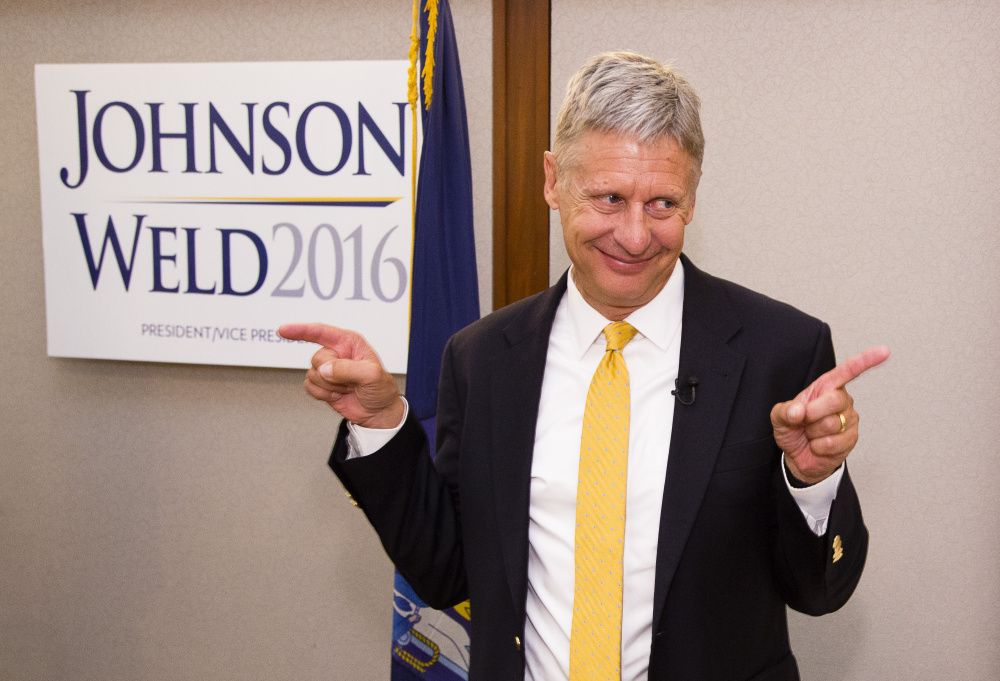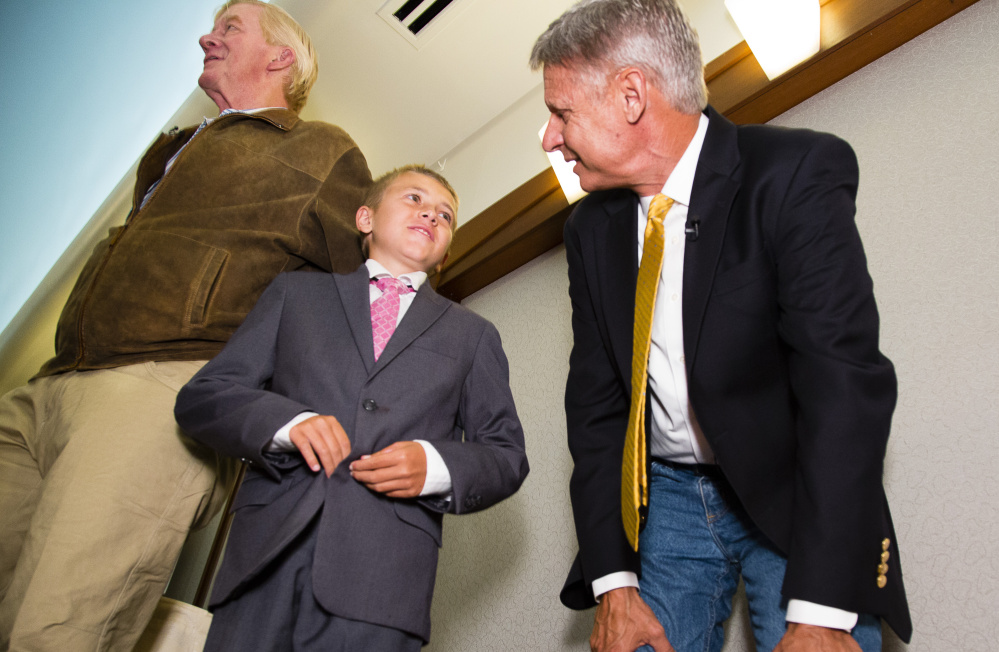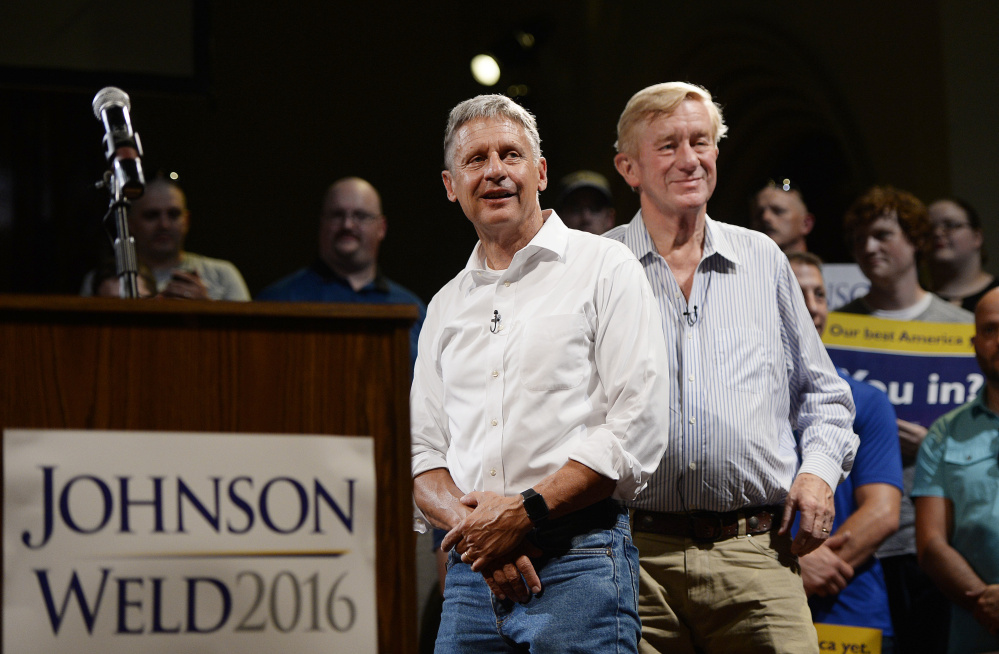Lewiston School Committee Chairwoman Linda Scott does not believe that casting a ballot for Libertarian presidential candidate Gary Johnson and running mate Bill Weld is tantamount to throwing away her vote.
“This is a message and a team that I can proudly stand behind,” she said before a crowd of about 650 at a Johnson-Weld rally Friday evening at the Franco American Heritage Center in Lewiston. “Don’t try to scare or shame me into voting for somebody I don’t believe in.”
Johnson said his campaign is on a roll, raising $1 million a day in small donations and poised to claim a spot on the presidential debate stage by polling strong in swing states.
Johnson, a former New Mexico governor, and Weld, a former governor of Massachusetts, visited Portland and Lewiston on Friday as part of a New England campaign swing. Both stuck to basic stump speech material, struggling to introduce Johnson and his small-government, lower-spending, gentleman-like platform to a general audience, without much specific talk of Maine.
But during a press interview before his Lewiston appearance Friday evening, Johnson said he sees the fallout from Gov. Paul LePage’s meltdown over accusations of racism as an opportunity for Mainers to reconsider their options on Election Day.
Johnson said LePage’s racially charged comments are a sign of “how head-in-the-sand we are over this issue” of racial equality.
“In just reading the words that your governor was saying today, it highlights the importance of Black Lives Matter,” Johnson said. “Blacks are undergoing a shakedown,” he said, as evidenced by the fact that they are six times as likely as whites to be shot by police.
Before the candidates’ noon appearance in Portland, Weld laid out Johnson’s Maine appeal, aside from just the state’s fondness for independent candidates.
While Johnson supports free trade, which isn’t popular with Maine voters, Weld said the Navy and Air Force would “be big winners” under a defense-oriented Johnson military. As president, Johnson would boost those branches, which he sees as key to a strong defense, and cut the billions in military spending used to fund America’s role as the world’s police officer, Weld said. That bodes well for Bath Iron Works, which relies on big Navy shipbuilding contracts to keep thousands of Mainers employed.
But Johnson is in favor of free trade, and President Obama’s Trans-Pacific Partnership Agreement. The Maine congressional delegation opposes the 12-country trade deal, which would eliminate tariffs on internationally traded goods and services, because they believe that it would cost Maine jobs, especially in the paper and shoe manufacturing industries, where international competitors have little to no labor protections and extremely low wages. Johnson is confident America, with its extremely productive workers, will continue to maintain high-wage jobs, Weld said.
His worldview is more in line with Mainers’ views on immigration, however. Unlike Republican presidential nominee Donald Trump, who wants to deport illegal immigrants and severely curb immigration, Johnson wants to embrace foreigners, and employ them in fields plagued by worker shortages.
“We need to embrace immigration in this country,” Johnson said. “We are a country of immigrants. Immigration is a good thing.”
A recent Portland Press Herald poll found that 48 percent of Mainers surveyed thought immigrants strengthened the state compared to 32 percent who consider immigrants a burden on Maine.
Another of Johnson’s positions that is particularly popular, at least among the candidate’s supporters, is his advocacy for the legalization of narcotics.
The most thunderous applause of the night in Lewiston came when Johnson urged the audience to vote for the legalization of recreational marijuana in Maine.
“Let’s bring an end to the war on drugs,” he said.
Johnson said factors that distinguish him from opponents Trump and Democratic nominee Hillary Clinton include his humility, desire to serve the public and willingness to work with those at both ends of the political spectrum to find solutions.
He described his ticket as the “big, six-lane highway down the middle” between Trump and Clinton.
Still, some of Johnson’s views are to the right of any of his presidential opponents. He favors the elimination of all personal income and corporate taxes, and of major federal agencies including the departments of education, commerce, housing and urban development, and homeland security.
“I have no idea what those guys do, but you see more and more of them around,” he said of the Department of Homeland Security.
A new Quinnipiac University poll put Johnson at 10 percent in a four-way presidential race, and 62 percent of respondents believe he should be allowed to participate in the presidential debates. When he first joined the Johnson campaign, the well-connected Weld said he used to have to get out his “pickax” to dig up even $5,000 or $10,000 donations, but now, as the Trump-Clinton fight gets nastier, Weld is finding it much easier to get big donations by phone. He said the campaign website is now pulling in $1 million a day in donations.
On Aug. 8, Maine Sen. Susan Collins said she would be inclined to support a Johnson-Weld ticket if the positions were reversed.
Weld said the campaign is also polling above 15 percent in five or six swing states, which is vital to proving the campaign’s viability to the Commission on Presidential Debates, the organization that decides whether Johnson has earned a spot on the national stage for the upcoming debates. Some have argued that Johnson would need to poll above 15 percent nationally to claim that spot, while others say demonstrating 15 percent support in swing states ought to suffice.
Debate participation would boost his name recognition to 100 percent by Election Day, Weld said, and force an election based on merits. In that scenario, Weld said Johnson will win.
Johnson said he believes that if he makes the debates and becomes better known, a majority of American voters will warm to his message of limited government, fiscal responsibility, social progressivism and optimism about America’s future.
“Has life ever been better in this country? I mean, really,” he said. “Life is good in America.”
Send questions/comments to the editors.








Comments are no longer available on this story